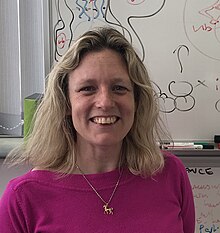Helen Walden FRSE is an English structural biologist who received the Colworth medal from the Biochemical Society in 2015.[1][2] She was awarded European Molecular Biology Organization (EMBO) membership in 2022. She is a Professor of Structural Biology at the University of Glasgow and has made significant contributions to the Ubiquitination field.[3]
Helen Walden | |
|---|---|
 Helen Walden | |
| Nationality | English |
| Known for | Study of Ubiquitination |
| Awards | Colworth Medal (2015) EMBO Member (2022) |
| Scientific career | |
| Fields | Structural biology |
Education and academic career
editHelen Walden studied for a BSc in Biochemistry at the University of Bath. She moved to the University of St Andrews and was awarded a PhD for investigating the structural basis of protein hyperthermostability. After a postdoctoral fellowship at St Jude's Children's Research Hospital, Walden moved to London to set up a lab at the Cancer Research UK London Research Institute (and now part of the Francis Crick Institute). After tenure, Walden moved to the MRC-Phosphorylation and Ubiquitylation Unit at the University of Dundee where in 2016 she was promoted to professor.[4] In 2017, Walden relocated her lab to the University of Glasgow as Professor of Structural Biology.[3]
Research interests
editAt St Jude's Children's Research Hospital, Helen Walden developed her interest in the mechanisms of ubiquitination, solving the structure of the E1 for Nedd8.[5][6] In London, Walden studied the specificity and regulation of E3 ubiquitin ligases.[7][8] In recent years Walden has studied the mechanism and disease association of E2-conjugating enzymes.[9] Walden has investigated the role of Parkin in Parkinson's disease.[10][11] Her study of the Fanconi Anemia pathway has allowed Walden to begin developing small molecules to target the pathway.[12]
Professional associations and awards
edit- In 2011, Walden joined the European Molecular Biology Organisation (EMBO) Young Investigator Program.[13]
- In 2015, Walden was awarded the Colworth medal from the Biochemical Society.[1][2]
- In 2016, Walden was awarded an ERC grant of €2 million to investigate DNA damage and repair.[14]
- In 2022, Walden was named as a Fellow of the Royal Society of Edinburgh.[15][16]
- In 2022, Walden was awarded EMBO membership.[17]
References
edit- ^ a b "The Colworth Medal | Biochemical Society". www.biochemistry.org. Archived from the original on 6 October 2016. Retrieved 19 December 2018.
- ^ a b SHussain (17 March 2014). "Dr Helen Walden awarded prestigious Colworth Medal". School of Life Sciences. Retrieved 19 December 2018.
- ^ a b "University of Glasgow - Research Institutes - Institute of Molecular, Cell and Systems Biology - All staff - Dr Helen Walden". www.gla.ac.uk. Retrieved 19 December 2018.
- ^ "Helen Walden Promoted To Professor | MRC PPU". MRC Protein Phosphorylation and Ubiquitylation Unit. Retrieved 19 December 2018.
- ^ "Cell Press: Cell Press". www.cell.com. Retrieved 19 December 2018.
- ^ Schulman, Brenda A.; Podgorski, Michael S.; Walden, Helen (March 2003). "Insights into the ubiquitin transfer cascade from the structure of the activating enzyme for NEDD8". Nature. 422 (6929): 330–334. Bibcode:2003Natur.422..330W. doi:10.1038/nature01456. ISSN 1476-4687. PMID 12646924. S2CID 4370095.
- ^ Walden, Helen; Lewis, Laurence P. C.; Cole, Ambrose R. (March 2010). "The structure of the catalytic subunit FANCL of the Fanconi anemia core complex". Nature Structural & Molecular Biology. 17 (3): 294–298. doi:10.1038/nsmb.1759. ISSN 1545-9985. PMC 2929457. PMID 20154706.
- ^ Walden, Helen; Shaw, Gary S.; Leslie, Simon J.; Sidhu, Ateesh; Barber, Kathryn R.; Burchell, Lynn; Chaugule, Viduth K. (20 July 2011). "Autoregulation of Parkin activity through its ubiquitin‐like domain". The EMBO Journal. 30 (14): 2853–2867. doi:10.1038/emboj.2011.204. ISSN 1460-2075. PMC 3160258. PMID 21694720.
- ^ Walden, Helen; Chaugule, Viduth; Alpi, Arno F. (15 October 2016). "Mechanism and disease association of E2-conjugating enzymes: lessons from UBE2T and UBE2L3". Biochemical Journal. 473 (20): 3401–3419. doi:10.1042/BCJ20160028. ISSN 1470-8728. PMC 5095918. PMID 27729585.
- ^ Walden, Helen; Arkinson, Connor (20 April 2018). "Parkin function in Parkinson's disease" (PDF). Science. 360 (6386): 267–268. Bibcode:2018Sci...360..267A. doi:10.1126/science.aar6606. ISSN 1095-9203. PMID 29674580. S2CID 5016723.
- ^ Walden, H.; Shaw, G. S.; Knebel, A.; Sundaramoorthy, R.; Toth, R.; Johnson, C.; Barber, K. R.; Condos, T. E. C.; Chaugule, V. K. (May 2017). "Parkin-phosphoubiquitin complex reveals cryptic ubiquitin-binding site required for RBR ligase activity". Nature Structural & Molecular Biology. 24 (5): 475–483. doi:10.1038/nsmb.3400. ISSN 1545-9993. PMC 5420311. PMID 28414322.
- ^ Morreale, Francesca E.; Bortoluzzi, Alessio; Chaugule, Viduth K.; Arkinson, Connor; Walden, Helen; Ciulli, Alessio (11 May 2017). "Allosteric Targeting of the Fanconi Anemia Ubiquitin-Conjugating Enzyme Ube2T by Fragment Screening". Journal of Medicinal Chemistry. 60 (9): 4093–4098. doi:10.1021/acs.jmedchem.7b00147. ISSN 0022-2623. PMC 5441753. PMID 28437106.
- ^ "22 young researchers join the EMBO 2011 Young Investigator Programme". EMBO. Retrieved 19 December 2018.
- ^ SHussain (4 February 2016). "Helen Walden awarded €2 million to investigate DNA damage and repair". School of Life Sciences. Retrieved 19 December 2018.
- ^ "Academic and artistic minds honoured as RSE Fellows". Royal Society of Edinburgh. 22 March 2022. Retrieved 3 April 2022.
- ^ "Academic and artistic minds honoured as RSE Fellows". www.gla.ac.uk. Retrieved 3 April 2022.
- ^ "EMBO elects 67 new members and associate members – Press releases – EMBO". 6 July 2022. Retrieved 12 January 2023.